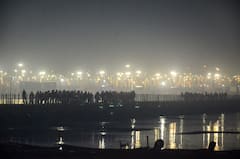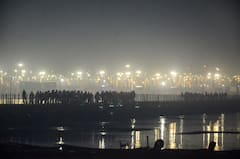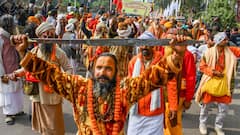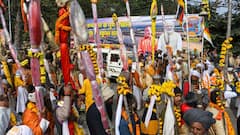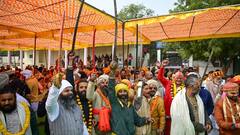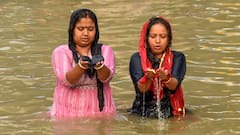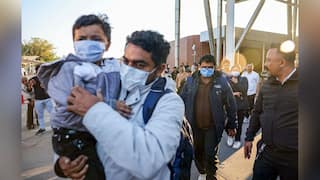Kumbh 2021: Lakhs Take Dip In Ganga On Occasion Of 'Shahi Snan' Amid Rising Coronavirus Cases
Led by their `mahamandaleshwaras', the sadhus from different akhadas took out shobha yatras through the main thoroughfare of the pilgrimage city to gather at Brahma Kund, Hari ki Pairi for the shahi snan - or the royal bath -- on Somvati Amavasya.

Haridwar: Amid rising coronavirus cases nationwide, a sea of saffron-clad seers and ash-smeared Nagas converged at Har ki Pairi in Haridwar for a holy dip in the Ganga during the second shahi snan of the Kumbh Mela on Monday.
Led by their `mahamandaleshwaras', the sadhus from different akhadas took out shobha yatras through the main thoroughfare of the pilgrimage city to gather at Brahma Kund, Hari ki Pairi for the shahi snan - or the royal bath -- on Somvati Amavasya.
Marching barefoot to their destination, the seers took a dip in the river as they were showered with flower petals from helicopters arranged by the Uttarakhand government.
Masks were not worn by a large proportion and social distancing appeared impossible at an event in which, according to Chief Minister Tirath Singh Rawat, about 35 lakh people participated.
As the mammoth exercise was on, Mela Inspector General Sanjay Gunjyal said 100 per cent compliance with Covid-19 norms was not possible with such a large crowd of seers converging on the ghats.
But efforts were on to ensure that everyone adhered to them, he added.
Twenty-six people tested positive in the 9,678 random coronavirus tests conducted in the 'mela kshetra' on Monday. According to the routine tally authorities give out each evening, 408 fresh cases were detected during the past 24 hours across Haridwar district.
While Har ki Pairi, considered the holiest of the ghats was reserved for the akhadas from 7 am onwards, common people took the dip at the other ghats of the Ganga, revered by millions as a goddess.
Seers from Niranjani Akhada led by their mahamandaleshwar Acharya Kailashanand Giri were the first at this ghat. Sadhus from Ananda Akhada also went to the river with them.
They were followed by the Joona Akhada seers.
Former King of Nepal Gyanendra Bir Bikram Shah, on his maiden visit to Haridwar, was among the devotees who took a bath in the river.
It was the second shahi snan during the ongoing Kumbh Mela, which has been limited to just one month due to rising cases of coronavirus.
The last royal bath' was conducted on the occasion of Mahashivratri on March 11. The third shahi snan is on April 14.
Har Ki Pairi resonated with the chants of Har Har Mahadev throughout the day as the akhadas descended on the ghat in batches.
Sadhus from the Bada Akhada briefly sat on a dharna on the road, protesting that they were not being allowed to go up to the ghat during the time slot given to them.
The delay took place because the previous batch of Bairagi seers had taken a little longer than scheduled for their `snan'.
The akhada of transgenders led by mahamandaleshwar Lakshmi Narayan Tripathi took the dip along with the Joona Akhada seers. They came to Har ki Pairi dancing to drum beats.
However, Acharya Lakshmi Narayan took ill and fainted soon after the ritual bath and was rushed to hospital in an ambulance.
Maha Nirvani Akhada seers led by its mahamandaleshwar Vishokanand Maharaj arrived at the ghat at the end of a procession. Before taking a dip themselves, they bathed an idol of the Sun god kept in a palanquin.
More than 20,000 police and paramilitary personnel kept an eye over the mela area spread over 600 hectares.
At the end of the shahi snan, Chief Minister Rawat said the event was held on a grand scale, keeping its religiosity and fervour intact despite the odds posed by the pandemic .
Mela IG Gunjyal said the snan was conducted in an uninterrupted manner with no untoward incident being reported from anywhere in the mela kshetra extending from Haridwar to Devprayag.
"It was a huge exercise as security personnel deployed on the ghats had to keep the batches of seers and devotees thronging the ghats apart to prevent chaos, the officer said.
He said they had to ensure that each batch left the ghat in a safe manner, and in time to make room for the next group without disrupting the schedule.

Trending News
Top Headlines


















